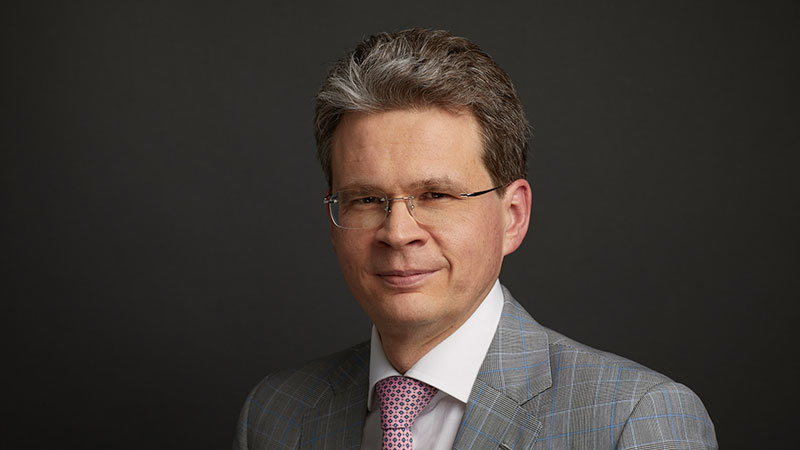New world, new opportunities

The era of unusually low interest rates is over. Amid this new world, are there opportunities for investors?
News headlines paint a bleak picture, but it’s not a black-and-white situation
With European winter inching closer and the pressures on energy supplies rising in parallel, Vontobel’s experts have analyzed the situation and taken a close look at four possible scenarios in a gas and energy crisis from investors’ point of view. The following is a summarized excerpt of a Sept. 6 livestream with Dan Scott, Vontobel’s head of multi asset, and Peter Romanzina, Vontobel’s head of equity research. The full replay is available here: https://www.vontobel.com/en-ch/connecting-insights/the-first-global-energy-crisis-how-real-is-it/
How we got here
Let’s begin by taking a step back and looking at how the current energy situation in Europe arose. A large part of it has to do with the ‘energy transition’ – the transition from fossil fuels towards low-carbon energy – and how we generate our electricity in the eurozone.
In Europe, some 43% of the energy supply mix is derived from nuclear- and coal-powered energy – elements that governments want to reduce as they don’t fit in with the ideological directives of ESG. Enter gas, which Europe relies upon to make up for energy supplies that wind, solar and hydro power don’t deliver. Prior to the war in Ukraine, Europe imported some 40% of its natural gas from Russia, meaning that current restrictions on Russian gas put the continent in a painful process of recalibration to meet energy requirements. Add to the mix reduced outputs from French nuclear power plants – due to maintenance and repairs, among other factors – and it’s clear a situation has arisen where electricity prices are rising and consumers are feeling the pinch.
Who is impacted
It’s important to understand that you can’t lump all of Europe together. The extent to which countries rely upon gas and nuclear power, for example, vary across the continent. This means the impact on consumers, and their wallets, will also differ according to where in Europe they call home. This winter, countries like Germany face a higher risk of power outages than, say, Spain, based on Germany’s reliance on Russian gas and its need to secure alternative energy supplies. But one thing is clear: the ripple effects from the war in Ukraine on the global energy situation will be widespread.
Let’s now shift from looking at how Europe came to be in its current energy crisis to assessing its potential economic impact. One burning question is whether the energy crisis can tip us into a global recession. Globally, the regional impact of the looming energy crisis is quite disparate. Take China, where Russian gas is flowing freely and nuclear reactors continue to be built. In today’s world, China’s energy situation is pretty secure, even if the nation needs to import quite a lot of its supply to meet demands. And the U.S. has historically always had an advantage thanks to cheap energy – in part thanks to hydrofracturing, or fracking, which is a drilling technology used to extract oil and gas from bedrock formations. That has allowed for a surge in US oil and gas production, and in turn lowered their energy prices. So, currently, it appears that Europe is facing a unique geopolitical situation energy-wise.
What does this mean? Well, it’s going to be a difficult environment for the eurozone. And there are other factors at play which could contribute to the likelihood of a recession: All eyes are also on how the Chinese economy will fare as cities slowly exit from Covid-related lockdowns, for example.
Why gas sets the scene
Focusing on Europe, investors should be aware just how impactful gas prices are. The wholesale energy market in Europe follows a marginal system: all energy producers receive the same amount of compensation for the energy they are producing, and this is set according to the highest production cost, which is generally generated by gas. Therefore, before Europe can exhale a collective sigh of relief, a significant drop in gas prices is required.
In the same way that the looming energy crisis is impacting geographical regions differently, not all industries will face the same challenges. Those that have gas make up a more significant part of their power mix will face greater challenges. Sectors with relatively low energy costs will fare better. One way to illustrate this is comparing the transportation and the pharmaceutical sector. The former obviously is very dependent on gas, and is hence more impacted than the latter, which is relatively less power-intensive. Of course, the pharmaceutical industry is still indirectly impacted, as its finished products still need to be transported, which shows how the cost of energy eventually ripples throughout most, if not all, industries, at varying levels.
Even as gas storage levels are quite full, there’s a risk that some European countries may resort to restrictions, especially as we don’t know how cold or long the winter will be just yet. That said, even if Europe’s industry avoids having to shutter-up this winter, they will want to have a long-term strategy in place.
The key takeaways
The bottom line? In every crisis, there’s opportunity. And the opportunities within energy transition are huge at this point in time. There’s common agreement that gas is the transition mechanism for moving from dirty fossil to clean renewable energy, yet gas is not the end solution. So, now that we’re forced to find a long-term solution quicker, this short-term disruption we’re facing could actually accelerate the energy transition in the long run.
* Gas prices are decisive for the European power market
→ Since gas is the “marginal supplier” on the European power market, power prices are rising along with gas prices
* Liquified natural gas has saved Europe so far
→ Apart from lower consumption, more than half of the lost Russian natural gas was compensated by higher liquified natural gas imports
* Demand destruction necessary going forward
→ Since higher LNG imports are limited due to capacity reasons, further Russian gas cuts can only be countered by consumption savings
* A lot of negativity is priced in
→ The financial markets have already priced in a very negative scenario for both EU gas prices and European assets











